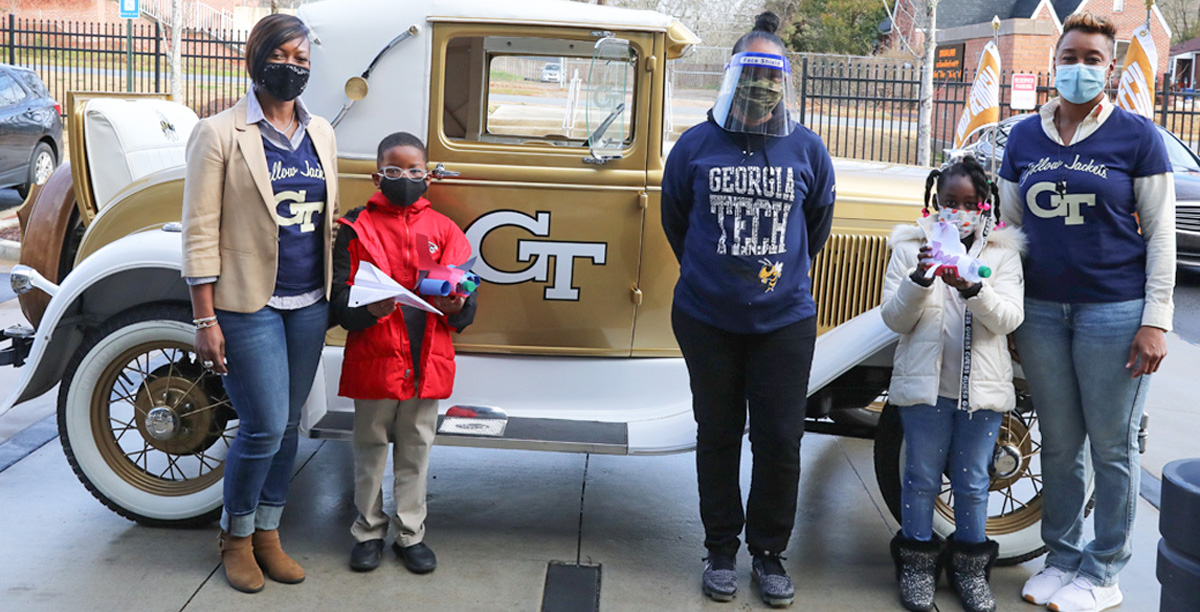
The Next Generation of Engineers: Tuskegee Airmen Global Academy students proudly presented their custom built aircraft to the Daniel Guggenheim School partners during the February 5 kick-off visit.
Last year at the height of the pandemic, students of all ages were learning virtually from home, many struggling to stay engaged. With this in mind, as well as Georgia Tech’s mission to expand access to STEM education, leadership from the School of Aerospace Engineering met with Atlanta Public Schools officials and asked, “How can we help?”
What happened next was the creation of a new partnership between the School and The Tuskegee Airmen Global Academy. The partnership will focus on K-12 curriculum and resources provided by the School and the Georgia Space Grant Consortium, featuring aerospace fundamentals that can be easily grasped by young students.
“Our goal is to be a long-term partner with the Academy and provide support and resources for their entire school as needed,” said Mark Costello, William R.T. Oakes Professor and School chair. “We want to foster continuous engagement with our local school systems to help instill the importance of STEM education starting at an early age.”
The Tuskegee Connection
The Tuskegee Airmen were the first Black military aviators in the U.S. Army Air Corps, a precursor of the U.S. Air Force. Trained at the Tuskegee Army Air Field in Alabama, they flew more than 15,000 individual trips in Europe and North Africa during World War II.
 |
| Professor Stephen Ruffin waits by the Wreck before the Academy's students present their aircraft project. |
Their impressive performance earned them numerous distinctions and helped encourage the eventual integration of the U.S. armed forces. The Academy was named for the Tuskegee Airmen, seeking to honor both the men and women who were pioneers, leaders, innovators, and role models.
“When we think of the Tuskegee Airmen, and that body of people and their work, it is very inspiring and it’s everything we want our students to be,” said Tuskegee Airmen Global Academy Assistant Principal Nechelle Sharpe.
The partnership has an even deeper connection for the School's Associate Chair and Georgia Space Grant Consortium Director Stephen Ruffin.
“My father, Spaulding Ruffin, was a Tuskegee Airmen, so when we connected with the Academy, it felt like I was helping to fulfill some of his mission,” said Ruffin. “He would have been thrilled with what we are doing through the partnership and that I can play a role in that.”
Engaging with the Academy
One of the first engagement activities, held February 5, introduced balsa wood glider kits to the Academy’s fourth grade class. Sharpe and the Academy’s staff welcomed the aerospace engineering school staff and the Ramblin’ Wreck to their campus. Georgia Tech provided project kits that included materials and supplies for the glider project, a specially-designed project workbook, and a set of supplementary NASA activities for students who can’t get enough. For students that were home for virtual learning, the gliders were delivered door-to-door across the elementary school district.
 |
|
To make sure all of the students received their kits, the School sent them via the Stingerette and the Ramblin Wreck - driven by Ethan Rosman. |
“As a proud graduate of the Atlanta Public School system, it means a great deal to me personally to see our faculty and students encourage STEM education within our local communities,” said Raheem Beyah, dean and Southern Company chair of the College of Engineering at Georgia Tech. “Providing accessible STEM education to K-12 students, especially those from minority communities around Atlanta, is critical to the mission of the College to diversify the field of engineering.”
More than 50 aerospace engineering undergrad and graduate students have volunteered to create lesson content and host virtual classes alongside the Academy’s teachers. Spearheaded by lecturer, Kelly Griendling, the inaugural glider project took the AE 1601: Intro to Aerospace Engineering curriculum and modified it into a nine-week course for Jodi Kokoszka’s fourth grade class.
“It’s exciting to see the students so engaged. They are really following along with the virtual lessons and can’t wait to start building their gliders,” said Kokoszka. “This partnership is opening their eyes to what engineering is and exposing them to the different STEM careers that are out there.”
The School and the Academy are already discussing ideas for the next collaborative effort, which will take place later this year.
Kelsey Gulledge